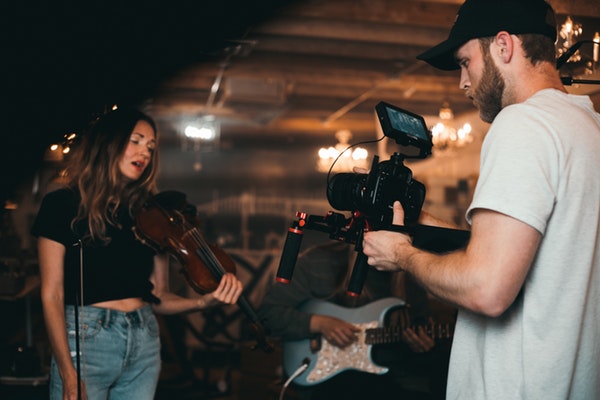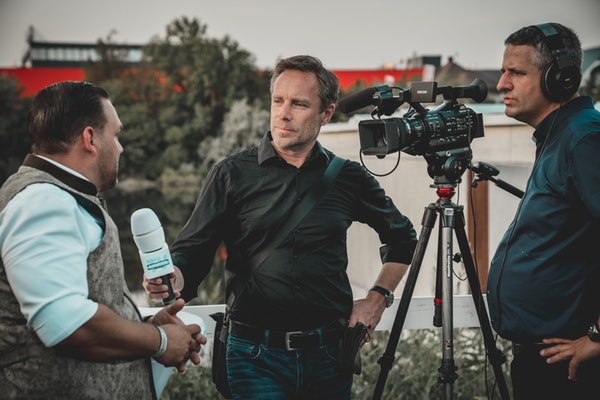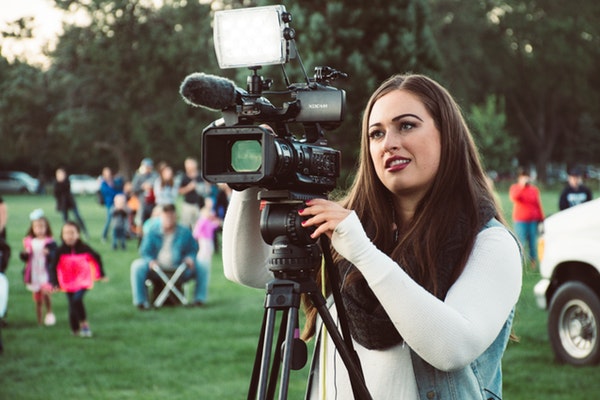
If you’re considering a career in film, you may be interested in the average videographer salary. Although salaries vary based on your industry and location, you can earn a decent wage without spending tons of time on your education. An ever-changing role, the duties of a videographer have evolved over the years along with technology. We’ll show you what responsibilities becoming a videographer includes, how you can qualify, and more.
WHAT IS A VIDEOGRAPHER?
A videographer, according to the dictionary, is a person who makes films using a video camera. The term became widely popular in the late 1900s due to the vast array of movies, videos, and films available. They are the people who are responsible for transporting and setting up video camera equipment to a film location, shooting, and then creating a movie or film clip. Unlike a cinematographer who works with major motion pictures, videographers tend to work with electronic media.
Videographers are highly creative people, and they often have an eye for capturing the action. You can find them hired anywhere film is required, including a wide range of areas. From college basketball games to war zones, advertising agencies to local new studios, videographers are needed to handle the images. They commonly work on smaller productions, including:
- Commercials
- Weddings
- Documentaries
- Music videos
- Corporate promotions
They often work alone, but they might work as a part of a larger team. If you work with other people, they are probably in lighting, sound, or equipment maintenance. As a videographer, you will most likely work in a smaller venue. If a film crew isn’t viable for the project, you can bet a videographer lands the job.
Also known as a video pro, they might work in various fields and types of weather. Most in the area are known for working with major motion pictures. However, this professional can find jobs to make a good living in many venues. Some videographers risk their lives to capture daunting images of war, disease, or natural disasters. Others work to create television shows.
Videographers are, overall, a blend of creative and mechanical professionals. They capture or recreate real life through a camera lens, whether it’s beautiful or ugly. The work isn’t all glamorous, as these professionals are often exposed to unusual elements like smoke, loud noises, fumes, or extreme outdoor temperatures. You might stand for long periods of time or lug around heavy equipment.
DAILY DUTIES

Photo by cottonbro from Pexels
A videographer may spend much of their time maintaining video camera equipment, shooting, and editing moving images on film or video. However, these people also wear a range of other creative hats. They might synchronize a soundtrack to fit the video, or only operate the camera. Sometimes you’re involved from the beginning stages of development until editing and completing a film. Other times, you might only be involved in the post-production portion after the action was shot.
Responsibilities include:
- Deciding what equipment is required for the project
- Setting up and disassembling the camera, lighting, microphones, props, and audio recorders
- Interviewing or shooting people to create a film, possibly in a studio environment
- Editing raw footage
- Adding in closed captions, on-screen text, and graphics into a video
- Inserting special effects to edit film
- Cleaning and maintaining equipment
- Completing small equipment repairs
- Collaborating with a film team, creative director, or video product
- Troubleshooting issues
- Negotiate pricing and rates
The tasks you complete, however, vary based on your role. Different types of videographers may be hired to perform specific jobs based on the skills they possess. Duties and responsibilities may vary based on the type of even you cover as well. If you work on a freelance basis, you will also need to find clients, track the time you spend working, and send out invoices or timesheets to get paid.
QUALIFICATIONS TO BECOME A VIDEOGRAPHER

Photo by Matheus Bertelli from Pexels
To become a videographer, you need knowledge on video camera hardware and at least a high school diploma. Although formal education isn’t always a job requirement, you need specific expertise in camera equipment and editing software. Computer skills are vital.
The hardware you need to understand can range, including camera equipment, digital editing equipment, scripting software, video editing software, and switching equipment. The programs you use often have many functions for your editing needs, but technology is ever-changing. You may want to gain hands-on experience using software such as:
- Adobe Create Suite – editing, marketing, or scripting
- Celtx – video planning and scripting
- Pinnacle Studio 16 – video editing
- Corel Video Studio Ultimate
- Photoshop
- Cinema 4D
- iMovie
- Apple Final Cut Pro X
- Windows Movie Maker
Requirements vary based on the employer, as they might seek something different depending on the project they have in mind. Employers commonly look for at least a year of related work experience. Any position is ordinarily excellent as long as it directly correlates with the responsibilities the current job requires.
If you have completed a degree from an accredited institution, which is more than the minimum requirements for this occupation, you might be able to land a position without prior experience. You can earn a bachelor’s degree in videography or a related field to attempt a more lucrative videographer salary.
Education is often traded for hands-on learning and vice versa. The important thing is that you show the employer you have the knowledge to complete the job well. Put together a portfolio, which can showcase all previous work and target your main abilities. Show future employers what you can do.
All videographers are expected to have the following characteristics:

Photo by Kyle Loftus from Pexels
- Creativity
- Physical stamina and mobility
- Bravery to accomplish the right shot
- Attention to detail
- Good listening skills
- Flexibility
- Organization
- Time management
- Passion for film
- Patience
- Determination
- Computerized editing software and equipment
- Technical knowledge for lighting, video setup, operation, and audio production
- Understanding of post-production techniques
- Ability to work under tight deadlines and pressure
Finally, videographers are required to possess their own equipment in many situations.
WHO HIRES A VIDEOGRAPHER?

Photo by Redrecords ©️ from Pexels
Videographers are hired to work anywhere that records videos, typically for use on the internet or in entertainment avenues like TV and film. They often capture sporting events or weddings, and they can work on a full or part-time basis. Most working hours include weekend and evening hours, and videographers might need to travel depending on where large events take place.
Businesses and small venues commonly hire videographers on a permanent basis. However, many videographers choose to work on a freelance basis. That way, they can balance their time more evenly between traveling to events to capture the action in the field and editing the footage in an office environment.
AVERAGE VIDEOGRAPHER SALARY
According to the United State Bureau of Labor Statistics (BLS), film and video editors make a mean annual wage of $86,830 or an hourly wage of $41.75.
Keep in mind, however, that a videographer salary varies based on industry and location. If you can find work as a videographer for major motion pictures, you may earn among the highest wages in the industry, with a salary of $94,860 per year. You may also be able to work for yourself as a freelance videographer, especially if you have plenty of experience in your industry. Other top-paying industries for videographers include:
- Accounting, Tax Prep, Bookkeeping, Payroll Services – $91,300
- Scientific and Technical Consulting Services – $81,500
- Management Companies – $78,520
- Employment Services – $78,520
- Advertising and Public Relations – $69,580
- Radio and TV Broadcasting – $64,000
- Independent Artists – 65,850
While some states have little to no need for videographers at all, such as Nebraska or Louisiana, other locations have top-paying roles. You may find a high salary in one of the following top paying states for videographers, according to the BLS:
- California – $112,530
- New York – $92,170
- New Jersey – $87,150
- Massachusetts – $74,090
- Connecticut – $73,710
More specifically, the highest-paid videographers are employed in the Los Angeles, California metropolitan area. The second-highest paid in this occupation are employed in New York City. If you want to work in this field, you’re probably going to find the highest salaries and job prospects in a larger city. Even Atlanta, Miami, Dallas, Washington D.C., Detroit, Denver, and San Francisco top the list of high employment level areas.
BENEFITS

Photo by Brett Sayles from Pexels
Videographers don’t typically receive benefits, as many are self-employed or hired by event basis. Like all freelancers, this means they might have to cover the cost of their own life and health insurance as well as vacation time. Make sure you also start saving for retirement because you might need it later. Employers who hire full-time videographers may provide basic benefit packages, but it’s not common practice.
A FINAL TIP

If you want to become a videographer, you can start learning immediately. Formal education isn’t a requirement as much as proven skill and experience, so sign up for a few online videography courses to get started. Self-taught videographers aren’t uncommon, so check out other online course platforms as well for the skills you’re interested in learning like Udemy.
Leave a Reply